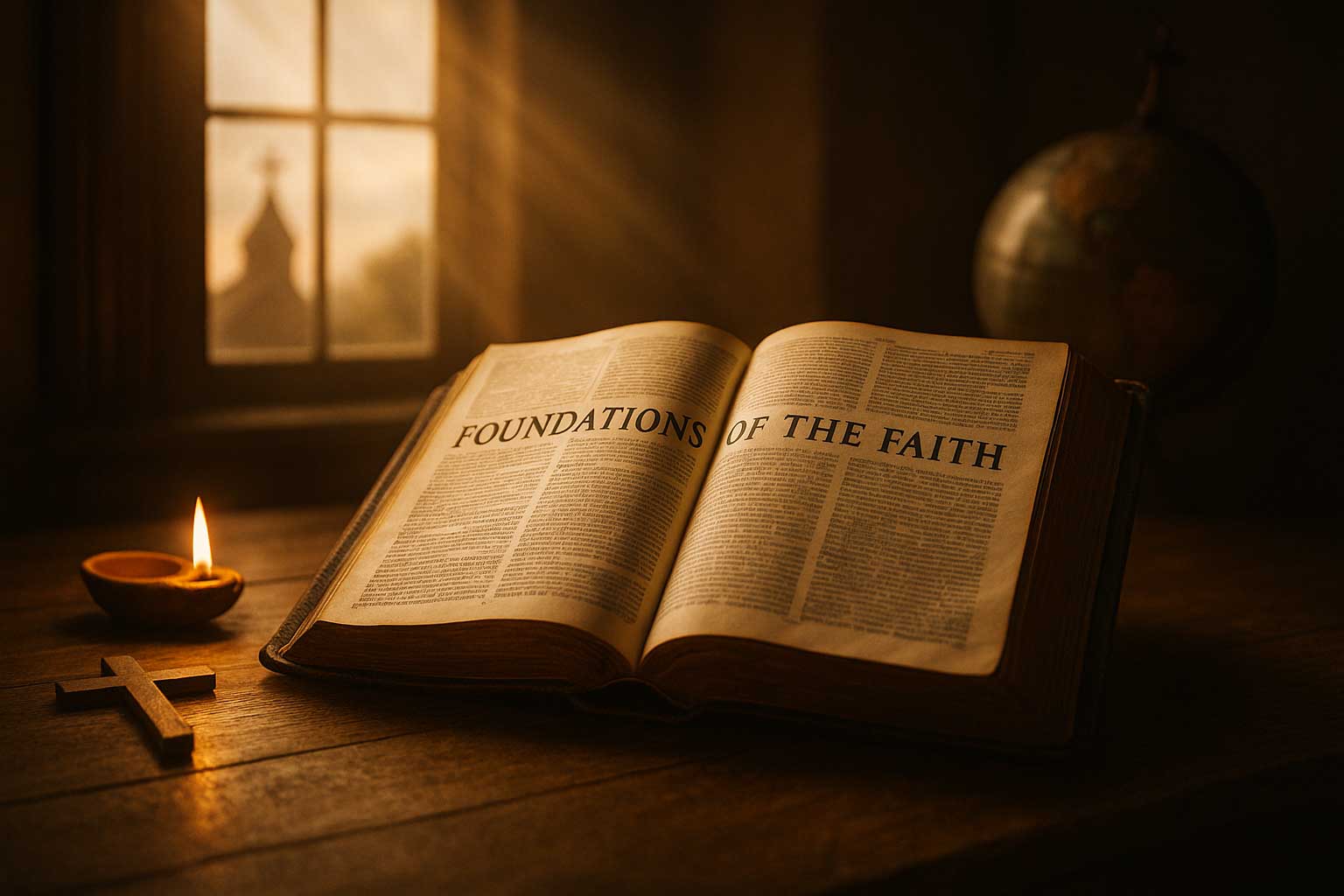Foundations of the Faith

Understanding the Core Beliefs That Anchor Christianity
The Christian faith rests on a set of timeless truths — convictions rooted in God’s self-revelation through Scripture, confirmed by history, and experienced personally by believers through the work of the Holy Spirit. These foundations are not man-made traditions or shifting philosophies; they are the bedrock upon which the Church has stood for centuries.
In this overview, we’ll explore the essentials of Christian belief: the nature of God, the reality of creation and sin, the promise of redemption, and the hope of restoration. We’ll also look at the Apostles’ Creed and Nicene Creed — concise summaries of the faith that have guided the Church for generations — and reflect on why “faith without works is dead” (James 2:26).
1. Core Beliefs at the Heart of Christianity
The Trinity
Christians believe in one God who exists eternally in three persons — Father, Son, and Holy Spirit. This mystery, hinted at in the Old Testament and revealed fully in the New, shows us that God is relational by nature.
The Father is the source and sustainer of all things.
The Son (Jesus Christ) is the eternal Word made flesh, who came to redeem us.
The Holy Spirit is God’s presence in and among His people, guiding, empowering, and sanctifying.
Creation
Genesis begins with, “In the beginning, God created the heavens and the earth.” Christians believe that all life and matter originate from God’s creative will and purpose. Creation reflects His glory and goodness. Humanity, uniquely made in His image, was designed for fellowship with Him and stewardship over the earth.
The Fall
Humanity’s first disobedience, recorded in Genesis 3, brought sin and brokenness into the world. This “fall” separated humanity from God and introduced death, suffering, and moral corruption into human experience. All people are affected by this reality — what theologians call “original sin.”
Redemption
God’s plan from the beginning was not to abandon His creation but to redeem it. In the fullness of time, Jesus Christ came into the world, lived a sinless life, died on the cross as the perfect sacrifice for sin, and rose from the dead to conquer death. Redemption is God’s work of reconciling us to Himself through faith in His Son.
Restoration
The Bible closes with a vision of the new heavens and new earth (Revelation 21–22). God’s ultimate purpose is to restore all things, remove every trace of sin, and dwell with His redeemed people forever. This is the Christian’s living hope.
2. The Apostles’ Creed
The Apostles’ Creed is one of the earliest statements of Christian faith, widely used across denominations. While not written by the apostles themselves, it faithfully summarizes apostolic teaching:
I believe in God, the Father almighty,
creator of heaven and earth.
I believe in Jesus Christ, his only Son, our Lord,
who was conceived by the Holy Spirit,
born of the Virgin Mary,
suffered under Pontius Pilate,
was crucified, died, and was buried;
he descended to the dead.
On the third day he rose again;
he ascended into heaven,
he is seated at the right hand of the Father,
and he will come to judge the living and the dead.
I believe in the Holy Spirit,
the holy catholic Church,
the communion of saints,
the forgiveness of sins,
the resurrection of the body,
and the life everlasting. Amen.
This creed is both personal (“I believe…”) and communal (“the communion of saints”), uniting believers around shared truth.
3. The Nicene Creed
The Nicene Creed (A.D. 325, revised 381) emerged from the early Church’s effort to clarify the deity of Christ and the nature of the Trinity in the face of heresy:
We believe in one God,
the Father Almighty,
Maker of heaven and earth,
and of all things visible and invisible.
And in one Lord Jesus Christ, the only-begotten Son of God,
begotten of the Father before all worlds;
Light of Light, very God of very God;
begotten, not made, being of one substance with the Father,
by whom all things were made.
Who, for us men and for our salvation, came down from heaven,
and was incarnate by the Holy Spirit of the virgin Mary,
and was made man;
and was crucified also for us under Pontius Pilate;
he suffered and was buried;
and the third day he rose again, according to the Scriptures;
and ascended into heaven,
and sits on the right hand of the Father;
and he shall come again, with glory, to judge the quick and the dead;
whose kingdom shall have no end.
And we believe in the Holy Spirit, the Lord and Giver of Life;
who proceeds from the Father [and the Son];
who with the Father and the Son together is worshiped and glorified;
who spoke by the prophets.
And we believe one holy catholic and apostolic Church.
We acknowledge one baptism for the remission of sins;
and we look for the resurrection of the dead,
and the life of the world to come. Amen.
The Nicene Creed is a theological anchor, ensuring that the Church’s understanding of God is consistent with Scripture.
4. Grace, Faith, and Works
Grace Alone
At the heart of Christianity is the conviction that salvation is by grace alone. We cannot earn it by moral effort, religious rituals, or good deeds. Grace is God’s unmerited favor toward sinners.
Faith Alone
Faith is the means by which we receive God’s gift of salvation. To believe in Christ is to trust Him completely — His death as payment for sin, His resurrection as the guarantee of life.
Works as the Fruit of Faith
James 2:26 says, “Faith without works is dead.” This doesn’t mean works save us; rather, genuine faith inevitably produces good works. The reformers put it this way: We are saved by faith alone, but the faith that saves is never alone.
5. Key Scriptures That Anchor the Faith
John 3:16 – God’s love and the promise of eternal life through belief in His Son.
Ephesians 2:8–9 – Salvation by grace through faith, not works.
Romans 5:8 – God’s love demonstrated in Christ’s death for sinners.
1 Corinthians 15:3–4 – The core Gospel: Christ died, was buried, and rose again.
2 Timothy 3:16–17 – Scripture is God-breathed and equips believers for every good work.
6. Living in the Light of These Foundations
Knowing the essentials of the faith isn’t just an academic exercise. These truths are meant to shape:
How we see God — as holy, loving, and faithful.
How we see ourselves — as sinners saved by grace, called to holiness.
How we see the world — as God’s creation, marred by sin, yet destined for restoration.
Living from these foundations means clinging to Christ in times of uncertainty, standing firm against false teaching, and joyfully sharing the hope we have with others.












